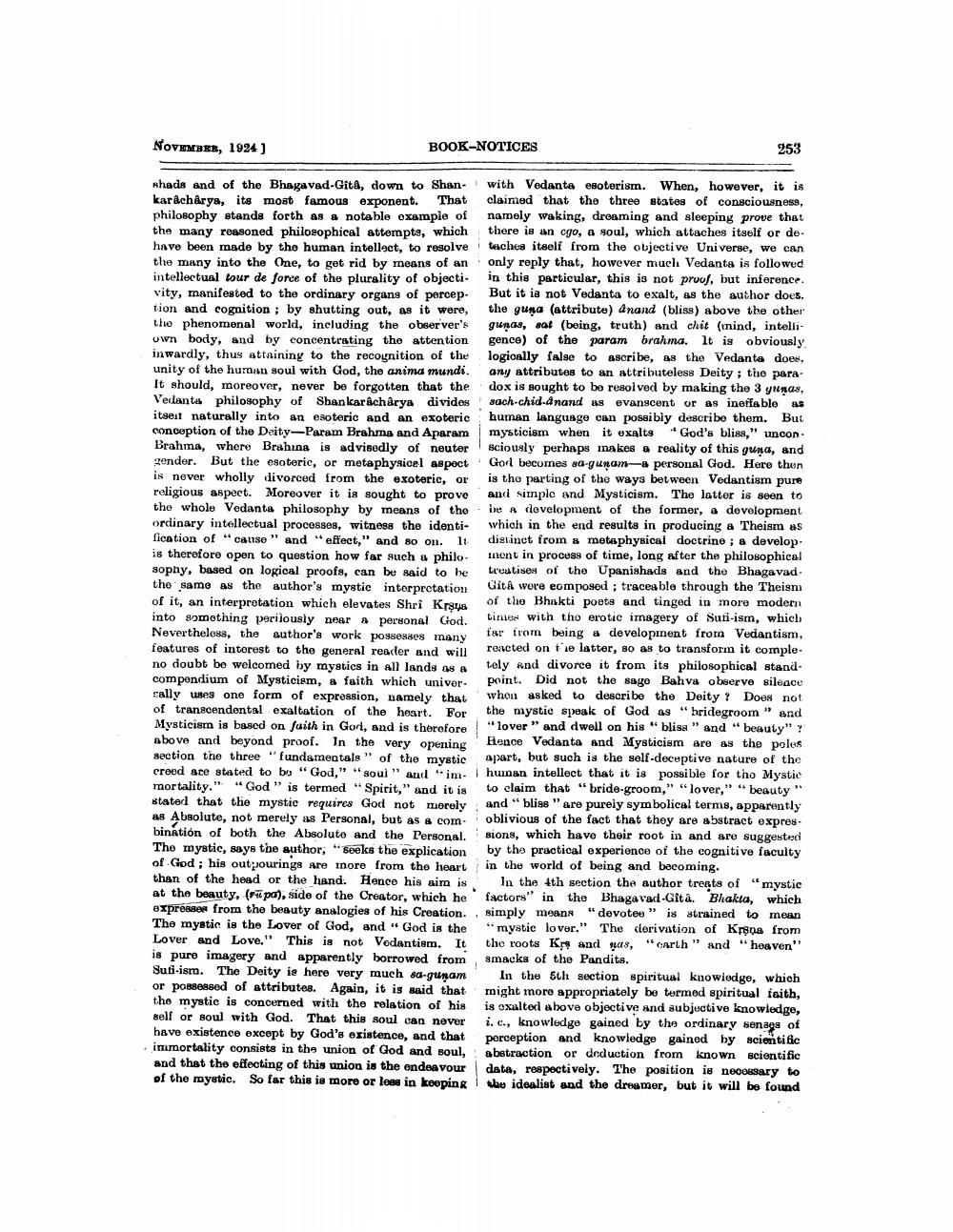________________
NOVEMBER, 1924]
shads and of the Bhagavad-Gita, down to Shankaracharya, its most famous exponent. That philosophy stands forth as a notable example of the many reasoned philosophical attempts, which have been made by the human intellect, to resolve the many into the One, to get rid by means of an intellectual tour de force of the plurality of objectivity, manifested to the ordinary organs of percep tion and cognition; by shutting out, as it were, the phenomenal world, including the observer's own body, and by concentrating the attention inwardly, thus attaining to the recognition of the unity of the human soul with God, the anima mundi. It should, moreover, never be forgotten that the Vedanta philosophy of Shankaracharya divides itsest naturally into an esoteric and an exoteric conception of the Deity-Param Brahma and Aparam Brahma, where Brahina is advisedly of neuter gender. But the esoteric, or metaphysical aspect is never wholly divorced from the exoteric, or religious aspect. Moreover it is sought to prove the whole Vedanta philosophy by means of the ordinary intellectual processes, witness the identification of "cause" and "effect," and so on. It is therefore open to question how far such a philo. sophy, based on logical proofs, can be said to be the same as the author's mystic interpretation of it, an interpretation which elevates Shri Krsua into something perilously near a personal God. Nevertheless, the author's work possesses many features of interest to the general reader and will no doubt be welcomed by mystics in all lands as a compendium of Mysticism, a faith which universally uses one form of expression, namely that of transcendental exaltation of the heart. For Mysticism is based on faith in Gori, and is therefore above and beyond proof. In the very opening section the three "fundamentals" of the mystic creed are stated to bo "God," "soul" and "im mortality." "God" is termed "Spirit," and it is stated that the mystic requires God not merely as Absolute, not merely as Personal, but as a com bination of both the Absolute and the Personal. The mystic, says the author; "seeks the explication of God; his outpourings are more from the heart than of the head or the hand. Hence his aim is at the beauty, (rupa), side of the Creator, which he expresses from the beauty analogies of his Creation. The mystic is the Lover of God, and "God is the Lover and Love." This is not Vedantism. It is pure imagery and apparently borrowed from Sufi-ism. The Deity is here very much sa-gunam or possessed of attributes. Again, it is said that the mystic is concerned with the relation of his self or soul with God. That this soul can never have existence except by God's existence, and that immortality consists in the union of God and soul, and that the effecting of this union is the endeavour of the mystic. So far this is more or less in keeping
BOOK-NOTICES
253
with Vedanta esoterism. When, however, it is claimed that the three states of consciousness, namely waking, dreaming and sleeping prove that there is an cgo, a soul, which attaches itself or detaches itself from the objective Universe, we can only reply that, however much Vedanta is followed in this particular, this is not proof, but inference. But it is not Vedanta to exalt, as the author does. the guna (attribute) anand (bliss) above the other gunas, sat (being, truth) and chit (mind, intelligence) of the param brahma. It is obviously logically false to ascribe, as the Vedanta does, any attributes to an attributeless Deity; the paradox is sought to be resolved by making the 3 yunas, sach-chid-anand as evanscent or as ineffable as human language can possibly describe them. But mysticism when it exalts "God's bliss," uncon sciously perhaps makes a reality of this guna, and Gol becomes sa-gunam-a personal God. Here then is the parting of the ways between Vedantism pure and simple and Mysticism. The latter is seen to be a development of the former, a development which in the end results in producing a Theism as distinct from a metaphysical doctrine; a develop. ment in process of time, long after the philosophical treatises of the Upanishads and the Bhagavad. Gitâ were eomposed; traceable through the Theism of the Bhakti poets and tinged in more modern times with tho erotic imagery of Suri-ism, which far from being a development from Vedantism, reacted on the latter, so as to transform it completely and divorce it from its philosophical standpoint. Did not the sage Bahva observe silence when asked to describe the Deity? Does not the mystic speak of God as "bridegroom" and "lover" and dwell on his "bliss" and "beauty" y Hence Vedanta and Mysticism are as the poles apart, but such is the self-deceptive nature of the human intellect that it is possible for the Mystic to claim that "bride-groom," "lover," "beauty and "bliss" are purely symbolical terms, apparently oblivious of the fact that they are abstract expres sions, which have their root in and are suggested by the practical experience of the cognitive faculty in the world of being and becoming.
In the 4th section the author treats of "mystic factors" in the Bhagavad-Gità. Bhakta, which simply means "devotee" is strained to mean "mystic lover." The derivation of Krsna from the roots Kr and as, "earth" and "heaven" smacks of the Pandits.
In the 5th section spiritual knowledge, which might more appropriately be termed spiritual faith, is exalted above objective and subjective knowledge, i. c., knowledge gained by the ordinary senags of perception and knowledge gained by scientific abstraction or deduction from known scientific data, respectively. The position is necessary to the idealist and the dreamer, but it will be found




